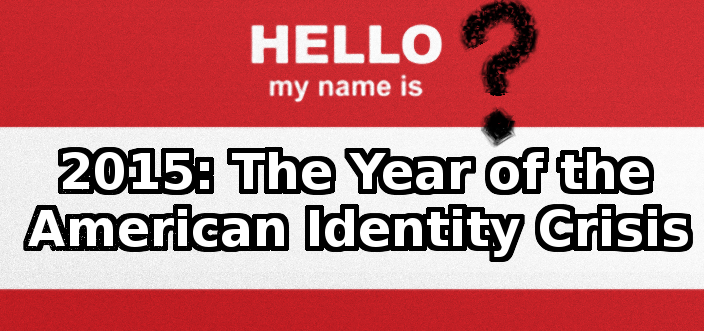
Race and sexual identity now make up a good portion of all media distractions. According to political activists, “symbols of oppression” now include Halloween costumes, the Confederate flag, and the color of Starbucks coffee cups. So shallow is our collective identity, that this now defines our most passionate debate. While the global economy deteriorates and our government pursues endless conflict across the planet, this is what Americans are most concerned about.
Identity issues make the perfect media story. For the 24-hour TV and internet rage business, these symbolic, but mostly linguistic fights generate strong emotional responses while being non-threatening to advertisers or to the government.
These relatively innocuous symbols have become lightning rods for attention, while real issues go ignored. We wrote in a previous article back in June: “[R]eal problems like mass incarceration, torture, endless war, the end of privacy, and widespread poverty are ignored. This is more than just a corrupt media distracting us with meaningless trivia. Americans literally cannot tell the difference between symbols and reality.”
I have long maintained that these sham fights are a symptom of a society that collectively no longer has any sense of identity. What makes life worth living? Family? That hardly seems true for many Americans. Family cohesion has been disintegrating for some time. A few of us try to define ourselves by hard work and material gain. Maybe that works for some, but how far does that go in an economy with 46 million people on food stamps and a shrinking middle class?
Of course, many of us do cling to the material aspects of life we hope will fill the void in our lives. Consider Black Friday, now practically a national holiday of consumer excess. Where employees once took off of work to spend time with family, they now schedule time to stand in lines and acquire larger — and “smarter” — television sets.
I remember when I was growing up, the terrible Jingle All The Way movie starring Arnold Schwarzenegger parodied toy crazed shoppers willing to step over one another to get a popular toy in time for Christmas. Watching it today, the scenes of barbarity in the toy stores seems more like a subdued documentary than parody.
Still, despite the increasing depravity of Americans who are willing to pummel, stab, shoot and pepper spray fellow shoppers, Black Friday sales still seem to disappoint retailers every year. It seems many of us can no longer afford to define our lives solely by electronic gadgets and other pieces of useless shit. For a while, naked consumerism was our god; now we don’t even have that.
In the past, Americans have had a strong sense of what sociologists call “negative identity” — we define ourselves by what we are not. For example, “We are not Nazis” or “We are not Communists.” The advantage of this kind of thinking is that it fortifies the national psyche against external enemies. Ultimately, it’s an unsatisfying way to live. When those enemies disappear, we seek out new villains to hate and destroy, the only meaning in life being found in death.
Historian and social critic Morris Berman writes that a negative identity “can never tell you who you actually are, in the affirmative sense. It leaves an emptiness at the center, such that you always have to be in opposition to something, or even at war with someone or something, in order to feel real.”
And, if our enemies are not sufficiently threatening, what’s left? As Chuck Palahniuk once wrote, “When we don’t know who to hate, we hate ourselves.”
The terrorist attack in Paris which killed 128 people prompted a tense reaction across the western world. If there is a similar attack in the United States with hundreds dead, we will pounce on whatever new scapegoat is offered. It will be tremendously frightening.
The government will easily rally a bloodthirsty and directionless public into supporting changes to the law that practically eliminate free speech, privacy, trial by jury and the few other protections the Constitution still provides. The security state is salivating at the potential to eliminate the last vestiges of civil liberties and envelope the nation in constant surveillance and eventually total tyranny. The key to their success is not that they promise security from terrorists, but rather they offer struggling Americans a reason to be alive — a fight against the “other.”
Usually, an identity crisis is temporary. Eventually, people discover a healthy identity for themselves and a sense of stability returns to their lives. But, under such constant political mismanagement and widespread criminality, what chance is there for a stable future? Very little it seems.

If you enjoyed this content, please donate. Even $1 or $5 makes a difference. You can donate via Paypal (see tip jar to the right) or with

